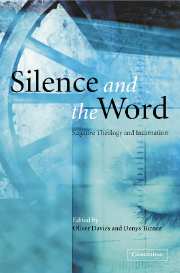Book contents
- Frontmatter
- Contents
- Notes on contributors
- Preface
- Introduction
- 1 Apophaticism, idolatry and the claims of reason
- 2 The quest for a place which is ‘not-a-place’: the hiddenness of God and the presence of God
- 3 The gift of the Name: Moses and the burning bush
- 4 Aquinas on the Trinity
- 5 Vere tu es Deus absconditus: the hidden God in Luther and some mystics
- 6 The deflections of desire: negative theology in trinitarian disclosure
- 7 The formation of mind: Trinity and understanding in Newman
- 8 ‘In the daylight forever?’: language and silence
- 9 Apophasis and the Shoah: where was Jesus Christ at Auschwitz?
- 10 Soundings: towards a theological poetics of silence
- Select bibliography
- Index
7 - The formation of mind: Trinity and understanding in Newman
Published online by Cambridge University Press: 22 September 2009
- Frontmatter
- Contents
- Notes on contributors
- Preface
- Introduction
- 1 Apophaticism, idolatry and the claims of reason
- 2 The quest for a place which is ‘not-a-place’: the hiddenness of God and the presence of God
- 3 The gift of the Name: Moses and the burning bush
- 4 Aquinas on the Trinity
- 5 Vere tu es Deus absconditus: the hidden God in Luther and some mystics
- 6 The deflections of desire: negative theology in trinitarian disclosure
- 7 The formation of mind: Trinity and understanding in Newman
- 8 ‘In the daylight forever?’: language and silence
- 9 Apophasis and the Shoah: where was Jesus Christ at Auschwitz?
- 10 Soundings: towards a theological poetics of silence
- Select bibliography
- Index
Summary
FLEEING APOPHASIS, AVOIDING THE TRINITY
The apparent anxiety driving Descartes' rush toward absolute certainty provoked one of his critics to remark: ‘Your new method denigrates the traditional forms of argument, and instead grows pale with a new terror, the imaginary fear of the demon which it has conjured up. It fears it may be dreaming, it has doubts about whether it is mad.’ It is a curious if not surprising feature of the modern quest for clear and distinct ideas that the more decisively all ambiguity is shunned, the more intolerable, even fearsome, becomes every aspect of real mystery. If it cannot be exposed as specious reasoning or ridiculed as abstruse ‘scholastic’ wrangling, it comes to be reviled as a dangerous threat to human freedom and flourishing. But, as Alciphron amiably reassures his friends in Berkeley's dialogue: ‘Fear not: by all the rules of right reason, it is absolutely impossible that any mystery, and least of all the Trinity, should really be the object of man's faith.’
Alciphron's comfortable dismissal of mystery to the contrary notwithstanding, I shall argue here that the more real mystery is not only tolerated but actually lived into, the more religious certainty comes to light and truth becomes embodied in a human life. Bishop Berkeley himself was pointing in this direction (though at the time few seem to have grasped the significance of his suggestion).
- Type
- Chapter
- Information
- Silence and the WordNegative Theology and Incarnation, pp. 136 - 158Publisher: Cambridge University PressPrint publication year: 2002

